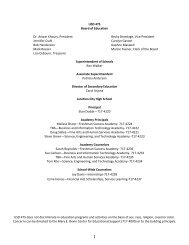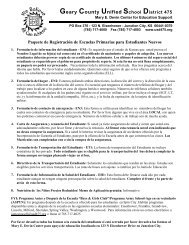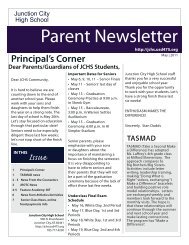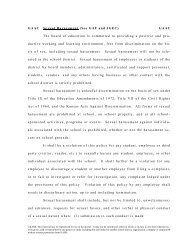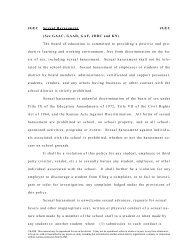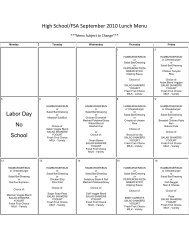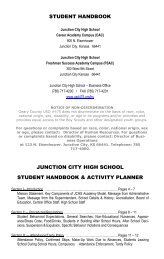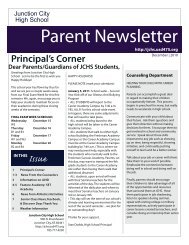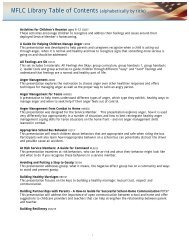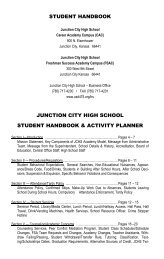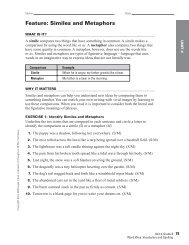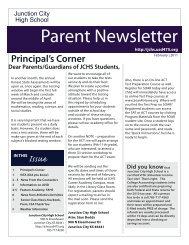Services Manual - Geary County Schools USD 475
Services Manual - Geary County Schools USD 475
Services Manual - Geary County Schools USD 475
Create successful ePaper yourself
Turn your PDF publications into a flip-book with our unique Google optimized e-Paper software.
<strong>USD</strong> <strong>475</strong><br />
Guide to Gifted <strong>Services</strong><br />
Mission Statement:<br />
The <strong>USD</strong> <strong>475</strong> Extended Learning program strives to coordinate<br />
staff, parent, student, and community efforts to make available<br />
appropriate curriculum, instruction, and learning opportunities<br />
that support gifted and talented students, ensuring them the<br />
opportunity to achieve at a level and pace commensurate with<br />
their abilities, interests, and needs.<br />
~<br />
In the state of Kansas, Gifted <strong>Services</strong> fall under the umbrella<br />
of Special Education. Therefore students are protected by<br />
IDEA (Individuals with Disabilities Education Act) which<br />
includes the development of an IEP should the child qualify for<br />
services.<br />
~<br />
General Information<br />
What is giftedness?<br />
What are some characteristics of gifted learners?<br />
<strong>USD</strong> <strong>475</strong> Gifted <strong>Services</strong><br />
How are students identified?<br />
What type of services may be offered for students?<br />
How will services be delivered?<br />
What are the responsibilities of family members?<br />
What are the responsibilities of district employees?<br />
Resources<br />
Parent Questionnaire
What is Giftedness?<br />
General Information<br />
United States Federal Government<br />
Children and youth with outstanding talent perform or show the<br />
potential for performing at remarkably high levels of<br />
accomplishment when compared with others of their age,<br />
experience, or environment<br />
These children and youth exhibit high performance capability in<br />
intellectual, creative, and/or artistic areas, possess an unusual<br />
leadership capacity, or excel in specific academic fields. They<br />
require services or activities not ordinarily provided by the schools<br />
Outstanding talents are present in children and youth from all<br />
cultural groups, across all economic strata, and in all areas of<br />
human endeavor.<br />
Kansas Department of Education<br />
‘Gifted’ is defined as ‘Performing or demonstrating the potential for<br />
performing at significantly higher levels of accomplishment when<br />
compared to others of similar age, experience and environment.’<br />
This level of accomplishment may be demonstrated by exceptional<br />
performance due to general intellectual ability or by excellence in<br />
one or more specific academic fields<br />
Kansas state statute requires Special Education services be<br />
provided through the development and implementation of<br />
individualized education plans (IEPs) for eligible students identified<br />
as gifted and needing special instructional support<br />
What are some Characteristics of Gifted Learners?<br />
Gifted children may exhibit many, but not necessarily all, of these<br />
characteristics:<br />
Has and outstanding memory; possesses a broader base of knowledge<br />
than peers<br />
May be an early reader<br />
Has advanced vocabulary for chronological age<br />
Learns rapidly, easily, and efficiently<br />
Enjoys learning<br />
Thrives on complexity<br />
Has the ability to concentrate for long periods of time<br />
May be impatient and intolerant<br />
Self-initiates learning<br />
Asks thoughtful or penetrating questions<br />
Is curious about many and different things
Has diverse interests<br />
Is intense; gets totally absorbed in activities and thoughts<br />
Is comfortable with abstract thinking<br />
Is an analytical thinker; perceives subtle cause-and-effect relationships<br />
May be able to attend to two or more things simultaneously<br />
Has strong feelings and opinions; advanced sense of justice and fairness<br />
Cares about ethical or humanitarian issues at an early age<br />
Sets high standards for him/herself as well as others<br />
Is persistent and highly motivated<br />
Has a sophisticated sense of humor; loves to play with words and ideas<br />
Transfers concepts and learning to new situations<br />
Sees connections between apparently unconnected ideas and activities<br />
May prefer the company of older children or adults<br />
Works well independently<br />
Exhibits leadership ability in peer group<br />
Displays original ideas; flexibility in problem solving situations<br />
Sees endless possibilities for various situations or uses for objects<br />
Is passionately interested in some topic or field of endeavor<br />
Is able to elaborate on ideas<br />
<strong>USD</strong> <strong>475</strong> Gifted <strong>Services</strong><br />
How are students identified?<br />
Level 1: Data Collection Phase – (See Data Collection Checklist in Appendix<br />
A) Student must meet criteria as being high achieving within the data<br />
collection phase in one or more areas(s), then they should be brought before<br />
the building Student Intervention/ Improvement Team (SIT) for further<br />
evaluation.<br />
Teacher Data:<br />
Pretest scores in math – 80% or higher<br />
Reading data (SRI, Lexile, STAR, Fluency, Flynt-Cooter, Reading<br />
Comprehension, Dibles) – two grade levels or more above current grade<br />
level placement<br />
Writing data (six-trait writing scores) – exceptional insight or creativity,<br />
scores of 4’s and 5’s<br />
State assessment scores (for all areas) – Exemplary<br />
PLAN test scores – composite at 90 th percentile or better<br />
Documentation of high academic ability (ie. Previous testing from other<br />
schools)<br />
Behavior – perfectionism, possible bossiness, may prefer to work alone,<br />
possible boredom, sometimes lack of concern about unfinished work, use<br />
of vocabulary that is above their peers, understanding of unique humor,<br />
and being overly sensitive to minute details
Parent Data:<br />
Parents sharing concerns about their child being bored, unchallenged, or<br />
that they would like more for their child from school<br />
Parents sharing the child’s projects that they have completed outside of<br />
school (watch for problem solving, creativity, and task commitment)<br />
Parents specifically requesting testing (for legal reasons, you need to<br />
contact your building’s Gifted Facilitator immediately)<br />
Level 2: Student Intervention/Improvement Team – (Sample forms in<br />
Appendix A) Referral to SIT allows more than one professional to review<br />
available data and collect more data in order to consider strategies that may<br />
benefit the student. At this level, the need for services must be<br />
demonstrated.<br />
Consider Information from teachers<br />
Consider Information from Cumulative folder<br />
Develop interventions for student<br />
Evaluate results of interventions<br />
Level 3: Testing – Once it has been determined that a student’s needs extend<br />
beyond the scope of serviced provided by the SIT committee, the team<br />
recommends testing.<br />
Academic and Intelligence testing administered by Gifted Facilitator and<br />
school Psychologist<br />
Level 4: Extended Learning Program/Writing the EL – Testing results<br />
determine formal admittance to <strong>USD</strong> <strong>475</strong>’s Extended Learning Program, a<br />
team is assembled to construct a plan (known as an Individualized Education<br />
Plan (IEP) specifically for that student.<br />
Team:<br />
Case Manager (generally building Gifted Coordinator)<br />
Parents and/or Guardians<br />
Regular Education Teacher(s)<br />
Administration Representative<br />
What type of services may be offered for students?<br />
Elementary –<br />
Study skills<br />
Research skills<br />
Interpersonal skills<br />
Cooperative learning<br />
Critical thinking skills
Problem solving skills<br />
Analytical thinking skills<br />
Enrichment in core areas (Science, Language Arts, Social Studies, and<br />
Math)<br />
Other activities as determined by individual needs<br />
Individual and group support and guidance in affective areas<br />
Middle School -<br />
Study skills<br />
Cultural literacy<br />
Learning styles<br />
Research skills<br />
Self-understanding<br />
DUKE Talent Search<br />
Self-initiated research projects<br />
Introduction to SAT and ACT<br />
Pre-AP skills (Critical reading, Analytical thinking, Detailed writing,<br />
Articulate speaking)<br />
Other activities as determined by individual needs<br />
Individual and group support and guidance in affective areas<br />
High School -<br />
College Admission test preparation<br />
Post Secondary preparation and planning<br />
Other activities as determined by individual needs<br />
Individual and group support and guidance in affective areas<br />
How will services be delivered?<br />
Elementary<br />
Students are bussed to one of two central locations (one on post, and one<br />
in town) for a 4-hour block of service time once per week.<br />
Middle School<br />
<strong>Services</strong> are provided through a pull-out model. Students are pulled from<br />
activity and/or elective time (depending on building).<br />
High School<br />
Students receive services during the initial segment of building-wide<br />
Seminar period once per week.<br />
What are the responsibilities of family members?<br />
Parent/Guardians<br />
Refer students for identification consideration
Provide and support learning opportunities out of the scope of the district’s<br />
jurisdiction (for example: summer enrichment programs, educational trips,<br />
cultural opportunities, and enrollment in college level coursework)<br />
Contribute to discussion and attend meetings pertaining to creating and<br />
renewing IEP<br />
Students<br />
Pursue more challenging and/or specialized learning experiences<br />
Learn to be appropriately assertive in requesting enrichment or<br />
advancement to meet your educational needs<br />
Contribute to discussion pertaining to creating and renewing IEP<br />
What are the responsibilities of district employees?<br />
Gifted Facilitator<br />
Coordinate staff, parent, student, and community efforts to make available<br />
appropriate curriculum, instruction, and learning opportunities that support<br />
gifted and talented students<br />
Administer appropriate testing for identification purposes<br />
Maintain and contribute to discussion pertaining to Individual Learning<br />
Plans (IEP) for identified students<br />
Provide individual and group support and guidance in affective areas<br />
Provide guidance to students in potential post-secondary plans<br />
Assist teachers in differentiating curriculum<br />
Providing additional instructional support in areas such as<br />
o Critical thinking skills<br />
o Problem solving skills<br />
o Research skills<br />
o Cooperative learning<br />
o Interpersonal skills<br />
o Study skills<br />
o Analytical thinking skills<br />
Facilitating independent study projects and courses<br />
Provide access to information about Duke Talent Identification Program<br />
(Which provides students with opportunity to take ACT or SAT and opens<br />
doors for possible summer enrichment programs through Duke, KU, etc)<br />
General Education Teachers<br />
Refer students for identification consideration<br />
Provide differentiated instruction and enrichment opportunities as defined<br />
by IEP<br />
Contribute to discussion and attend meetings pertaining to creating and<br />
renewing IEP<br />
Continued communication with gifted facilitator and parents regarding<br />
progress
Resources<br />
Kansas Department of Education (KSDE)<br />
http://www.kansped.org/ksde/gifted/giftedindex.html - Hosted in the special education<br />
portion of KSDE’s website, this site is a great starting point to explore what ‘gifted’ means<br />
within the realm of Kansas schools. Included are links to state requirements, definitions,<br />
and data along with both in and out-of-state resources<br />
Kansas Association for the Gifted, Talented, and Creative (KGTC) -<br />
http://www.kgtc.org/ - to promote, support, and improve services for talented,<br />
intellectually, and creatively gifted youth of Kansas<br />
National Association of Gifted Children (NAGC) - http://www.nagc.org/ -<br />
The National Association for Gifted Children (NAGC) is an organization of parents,<br />
teachers, educators, other professionals, and community leaders who unite to address<br />
the unique needs of children and youth with demonstrated gifts and talents as well as<br />
those children who may be able to develop their talent potential with appropriate<br />
educational experiences.<br />
We support and develop policies and practices that encourage and respond to the<br />
diverse expressions of gifts and talents in children and youth from all cultures, racial<br />
and ethnic backgrounds, and socioeconomic groups. NAGC supports and engages in<br />
research and development, staff development, advocacy, communication, and<br />
collaboration with other organizations and agencies who strive to improve the quality<br />
of education for all students.<br />
Supporting Emotional Needs of the Gifted (SENG) - http://www.sengifted.org/<br />
SENG is dedicated to fostering environments in which gifted adults and children, in all<br />
their diversity, understand and accept themselves and are understood, valued, nurtured,<br />
and supported by their families, schools, workplaces, and communities<br />
NEAG Center for Gifted Education and Talent Development -<br />
http://www.gifted.uconn.edu/ - The only federally funded research organization, known as<br />
The National Research Center on the Gifted and Talented (NRC/GT), has existed since<br />
1990 with various university partnerships. As of 2006, the University of Connecticut<br />
partnership is with the University of Virginia. The current research studies for the<br />
NRC/GT are an integrated approach to identifying, serving, and evaluating academic<br />
outcomes.
Student Name:<br />
Grade Level:<br />
Parent Questionnaire<br />
1. What special interests and/or skills does your child have? Give specific examples to illustrate.<br />
2. Describe your child’s current educational needs.<br />
3. Are these needs being met in the classroom?<br />
4. Describe any projects or activities that your child has completed that showed their abilities.<br />
5. Is there any educational testing that the school is not aware of?<br />
6. Is there anything else the school should take into account when considering your child’s<br />
educational placement?



